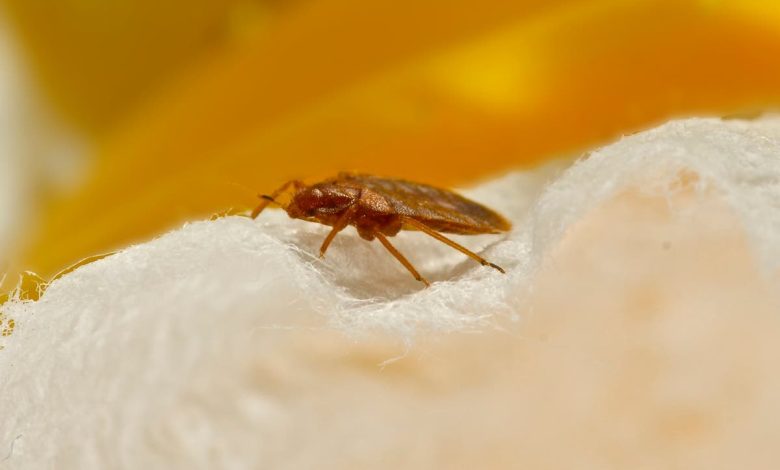How to get rid of bed bugs? The signs and symptoms as infestation could make its way from Paris to London – MyCyberBase

It was a not-so glamourous end to Paris Fashion Week, as a “widespread” outbreak of bed bugs caused panic and disgust in the French capital.
Paris authorities sent out a public warning that “no-one is safe”, with the small insects making their way through the city. In recent weeks and months, there have been numerous sightings on public transport and other locations.
“No one is safe. You can catch them anywhere and bring them home, and not detect them in time until they have multiplied and spread,” deputy mayor Emmanuel Grégoire, told French TV.
Videos posted on social media show insects crawling over seats on the Paris Metro as well as appearing in huge numbers on cinema seats.
Some users have also shared their experiences of being bitten by the critters.
So, how can you help protect yourself against a bedbug infestation? Here’s everything you need to know.
How do you know if you have bed bugs?
Bedbugs cause cause itchy welts aroud the body
(Getty Images/iStockphoto)
To find out if you have bed bugs, it’s best to keep an eye out for two things:
1. Bites on your body – these look like little red marks that cause itchy welts. “These welts usually appear in a zigzag pattern,” the American Academy of Dermatology Association says.
2. You should always keep an eye out for signs of bedbugs, this includes odour, specks of blood on bedding, exoskeletons, tiny blackish specks and eggs.
• Odour: If you notice a sweet or musty smell in your sleeping area, there might be a heavy infestation in the room, the AADA says.
• Specks of blood: Look at your bedding, mattress and furniture – if you notice specks of blood anywhere, the insects might have made their way into your home.
• Exoskeletons: The small insects have an outer shell that they shed and leave behind. Check for remains on your bedding, mattress and cushions.
• Tiny blackish specks: The blackish specks are a sign of beg bug excrement.
• Eggs: “After mating, female bed bugs lay white, oval eggs in cracks and crevices,” the AADA says on its website. These will be in the size of an apple seed, so keep your eyes peeled.
These small creatures can be found in your mattress as well as other spaces around your home
(Getty Images/iStockphoto)
How do I treat bedbug bites?
The NHS says bedbug bites usually clear up on their own in a week or so but there are a few steps you can take to help you during your recovery process:
• Put something cool, like a clean, damp cloth on the affected area to help with the itching and to ease off any swelling.
• Be sure to keep the affected area clean to prevent any further infection.
• Try your best not to scratch the affected area.
You can also get steroid creams like hydrocortisone cream to ease bedbug bites. However, children under 10 and women who are pregnant should get advice from a doctor before using this cream.
Another option would be to use antihistamines, these may help if the bites are very itchy and you’re unable to sleep, the NHS says.
How to get rid of bed bugs – the do’s and don’ts
You might have to call pest control to help you get rid of the insects.
(Getty Images)
It can be hard to get rid of the small insects on your own, so you might need to contact your local council or pest control service to get rid of the pesky creatures.
Here are some steps you can take to reduce bed bugs:
• Remove the affected bedding and clothing – wash on a hot wash of 60c and tumble try on a hot setting for at least 30 minutes.
• You can also put the infested bedding and clothing in a plastic bag and place It in your freezer for 3 to 4 days.
• It’s time to up your cleaning game – “bedbugs are found in both clean and dirty places, but regular cleaning will help you spot them early,” the NHS adds.
Here’s what you should avoid doing:
• Do not keep clutter around your bed, try to keep your space as clean as possible.
• Do not bring second-hand furniture indoors unless you have cleaned and carefully checked it.
• Do not take luggage or clothing indoors without checking it properly – especially if you have come from somewhere where you know there are bedbugs.
What are the causes of bedbugs and where do they live?
The wingless parasitic insects are found all around the world and may be linked to, more frequent travel, changes in pest control practices and insecticide resistance.
Bedbugs can be found in:
• Clothing
• Luggage
• Bedding
• Boxes
• Box springs
• Mattresses
• Headboards
• Objects near beds
According to the Mayo Clinic, they can also be found:
• Under peeling pain or loose wallpaper
• Under carpeting near baseboards
• In upholstered furniture seams
• Under light switch plates or electrical outlets
(Getty Images/iStockphoto)
Can bed bugs reach the UK?
The short answer is yes…
Bed bugs have a lifespan of between four to six months and are known to cling onto dirty suitcases – so it is possible that they may hitch a ride on the Eurostar which is just two hours away from London.
The Independent’s Barney Davis asked David Cain, founder and MD of Bed Bugs LTD and a qualified microbiologist, whether the bugs could survive the journey.
“Easily, yes, without a shadow of a doubt,” he responded.
, 2023-10-04 18:12:08 ,
#rid #bed #bugs #signs #symptoms #infestation #Paris #London
for more interesting Article Visit regularly : https://mycyberbase.com/





